LISTEN TO THE Invited Speakers
Ratih Ayu Apsari, M.Sc., Ph.D. Student
University of California, Berkeley, US

Ratih Ayu Apsari, M.Sc., Ph.D. Student
University of California, Berkeley, US
Ratih Ayu Apsari is a PhD student in the Learning Sciences and Human Development at the University of California, Berkeley. Her research centers on promoting epistemic diversity and cultural funds of knowledge among students by incorporating culturally situated embodied cognition into mathematics education. She is currently engaged in the Geometry Resources in Dance (GRiD) project, a design-based research intervention rooted in the tradition of Balinese dance. GRiD design consisted of a set of dancing geometry tasks and a learning environment as a gridded floor mat to objectify tacit attentional anchors for movement coordination into auxiliary lines for geometric practice. Students attend to and foreground particular lines on the mat in order to coordinate their dance movements. These tacit attentional anchors then become explicit auxiliary lines for geometric practice. For further information regarding her work, please visit bit.ly/GRiD
Ratih Ayu Apsari is a PhD student in the Learning Sciences and Human Development at the University of California, Berkeley. Her research centers on promoting epistemic diversity and cultural funds of knowledge among students by incorporating culturally situated embodied cognition into mathematics education. She is currently engaged in the Geometry Resources in Dance (GRiD) project, a design-based research intervention rooted in the tradition of Balinese dance. GRiD design consisted of a set of dancing geometry tasks and a learning environment as a gridded floor mat to objectify tacit attentional anchors for movement coordination into auxiliary lines for geometric practice. Students attend to and foreground particular lines on the mat in order to coordinate their dance movements. These tacit attentional anchors then become explicit auxiliary lines for geometric practice. For further information regarding her work, please visit bit.ly/GRiD
Wawan Hafid Syaifudin, S.Si, M.Si, MAct.Sc., ASAI, FSAI
PhD Students in Victoria University of Wellington

Wawan Hafid Syaifudin, S.Si, M.Si, MAct.Sc., ASAI, FSAI
PhD Students in Victoria University of Wellington
Wawan Hafid Syaifudin is an actuary and a PhD student at Victoria University of Wellington, New Zealand. Soon after the completion of his Master of Actuarial Science from the University of Waterloo, Canada, he worked for nearly four years as a lecturer at the Department of Actuarial Science, Sepuluh Nopember Intitute of Technology, Indonesia. Wawan specializes in actuarial science, financial mathematics, and stochastic processes. He is currently pursuing his PhD in Statistics with the research interest in actuarial science and stochastic processes. Recognized for his professional achievements, he is currently holding more than 13 professional designations/certifications both nationally and internationally from the Society of Actuaries of Indonesia, Islamic Insurance Society, International Association of Registered Financial Consultants, Financial Planning Standard Board, and LSP Pasar Modal.
Wawan Hafid Syaifudin is an actuary and a PhD student at Victoria University of Wellington, New Zealand. Soon after the completion of his Master of Actuarial Science from the University of Waterloo, Canada, he worked for nearly four years as a lecturer at the Department of Actuarial Science, Sepuluh Nopember Intitute of Technology, Indonesia. Wawan specializes in actuarial science, financial mathematics, and stochastic processes. He is currently pursuing his PhD in Statistics with the research interest in actuarial science and stochastic processes. Recognized for his professional achievements, he is currently holding more than 13 professional designations/certifications both nationally and internationally from the Society of Actuaries of Indonesia, Islamic Insurance Society, International Association of Registered Financial Consultants, Financial Planning Standard Board, and LSP Pasar Modal.
Russasmita Sri Padmi, M.Sc., Ph.D. Student
Johannes Kepler University Linz, Austria
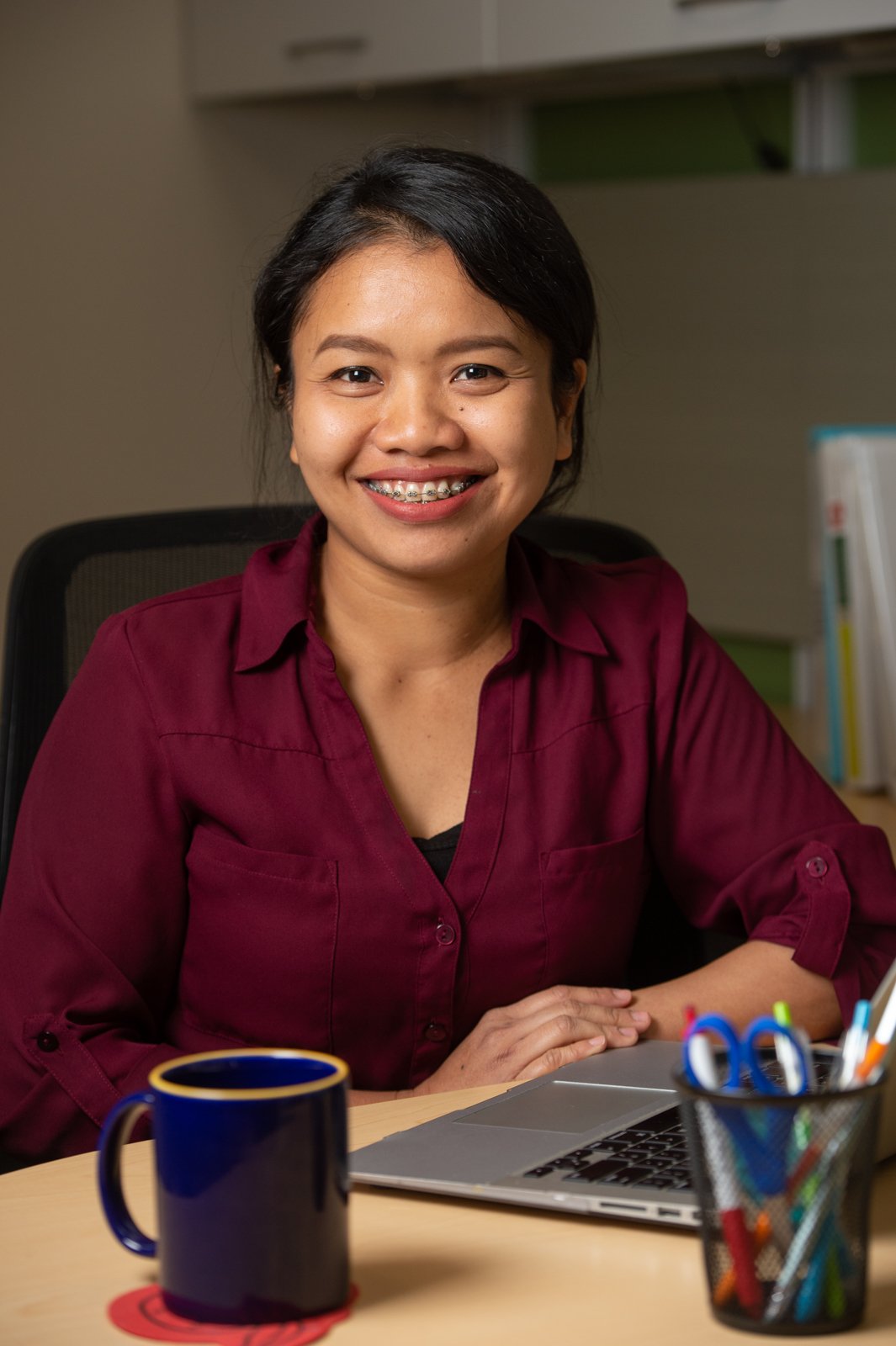
Russasmita Sri Padmi, M.Sc., Ph.D. Student
Johannes Kepler University Linz, Austria
Russasmita Sri Padmi is a Ph.D. student in Education at Johannes Kepler University Linz, Austria. Prior to her doctoral studies, she worked for seven years as a specialist at SEAMEO QITEP in Mathematics, a regional institution based in Yogyakarta, working on mathematics teachers’ professional development across Southeast Asia. She has been involved in teachers' professional development programs as both facilitator and organizer, as well as development of learning materials and assessment.
Her current work lies at the intersection of integrated STEM education, mathematics teachers’ professional learning, and boundary crossing, with a particular interest in how interdisciplinary approaches can prepare learners for real-world challenges. Russasmita is currently exploring how collaborative professional development models can support mathematics teachers in designing and implementing meaningful STEM learning experiences. She is also interested in promoting statistical literacy and global citizenship education through integrated STEM. Her work aims to challenge siloed educational structures and foster transformative, interdisciplinary practices in mathematics classrooms.
Russasmita Sri Padmi is a Ph.D. student in Education at Johannes Kepler University Linz, Austria. Prior to her doctoral studies, she worked for seven years as a specialist at SEAMEO QITEP in Mathematics, a regional institution based in Yogyakarta, working on mathematics teachers’ professional development across Southeast Asia. She has been involved in teachers’ professional development programs as both facilitator and organizer, as well as development of learning materials and assessment.
Her current work lies at the intersection of integrated STEM education, mathematics teachers’ professional learning, and boundary crossing, with a particular interest in how interdisciplinary approaches can prepare learners for real-world challenges. Russasmita is currently exploring how collaborative professional development models can support mathematics teachers in designing and implementing meaningful STEM learning experiences. She is also interested in promoting statistical literacy and global citizenship education through integrated STEM. Her work aims to challenge siloed educational structures and foster transformative, interdisciplinary practices in mathematics classrooms.
Ahmad Wachidul Kohar, S.Pd., M.Pd., Ph.D. Student
Michigan State University, USA
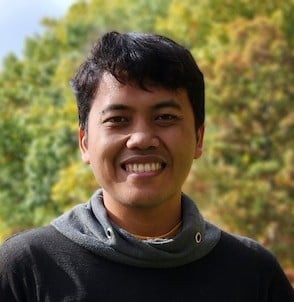
Ahmad Wachidul Kohar, S.Pd., M.Pd., Ph.D. Student
Michigan State University, USA
Ahmad Wachidul Kohar is an assistant professor in the Faculty of Mathematics and Natural Sciences and is currently pursuing a Ph.D. in Mathematics Education at Michigan State University, USA. His research focuses on supporting preservice teachers (PSTs) in developing problem-posing skills as cognitive, learning, and instructional goals. He is particularly interested in context-based problem posing, where real-life contexts serve as key elements in the design and analysis of mathematical tasks.
In his current work, Ahmad explores how PSTs learn to pose context-based mathematical tasks by engaging with generative artificial intelligence (AI). He investigates how AI tools can help PSTs unpack and make sense of the dimensions involved in creating meaningful, context-rich problems. Ahmad’s research highlights the experiences and challenges PSTs face in their problem-posing journey when partnering with generative AI tools, with a focus on identifying the critical features that define effective context-based mathematical tasks. This work ultimately aims to enhance PSTs' ability to pose high-quality problems, establishing problem-posing as a central learning objective in teacher education.
Ahmad Wachidul Kohar is an assistant professor in the Faculty of Mathematics and Natural Sciences and is currently pursuing a Ph.D. in Mathematics Education at Michigan State University, USA. His research focuses on supporting preservice teachers (PSTs) in developing problem-posing skills as cognitive, learning, and instructional goals. He is particularly interested in context-based problem posing, where real-life contexts serve as key elements in the design and analysis of mathematical tasks.
In his current work, Ahmad explores how PSTs learn to pose context-based mathematical tasks by engaging with generative artificial intelligence (AI). He investigates how AI tools can help PSTs unpack and make sense of the dimensions involved in creating meaningful, context-rich problems. Ahmad’s research highlights the experiences and challenges PSTs face in their problem-posing journey when partnering with generative AI tools, with a focus on identifying the critical features that define effective context-based mathematical tasks. This work ultimately aims to enhance PSTs’ ability to pose high-quality problems, establishing problem-posing as a central learning objective in teacher education.
Dayat Hidayat, S.Pd., M.Pd., M.Si., Ph.D. Student
Purdue University, USA
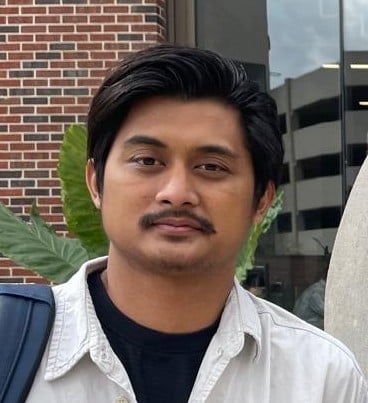
Dayat Hidayat, S.Pd., M.Pd., M.Si., Ph.D. Student
Purdue University, USA
Dayat Hidayat, S.Pd., M.Pd., M.Si. is an Assistant Professor in the Department of Mathematics Education at Universitas Negeri Surabaya (UNESA), Indonesia, and a Ph.D. student in Mathematics Education, Curriculum, and Instruction at Purdue University, USA. His research focuses on mathematical modeling in education, STEM education, preservice teacher development, and applied mathematics. His scholarly work has been published in several peer-reviewed international journals and conference proceedings. Dayat Hidayat earned his bachelor’s degree in mathematics education from Universitas Sultan Ageng Tirtayasa in 2014. He subsequently pursued a master’s degree in mathematics education at Universitas Pendidikan Indonesia (UPI), which he completed in 2017, and a second master’s degree in mathematics from Institut Teknologi Bandung (ITB), graduating in 2018. Upon completing his graduate studies, he began his academic career as an Assistant Professor at UNESA. From 2019 to 2024, Dayat Hidayat actively contributed to academia through teaching, research, publications, academic seminars, and community engagement. He has experience as secondary mathematics teachers and Prior to joining Purdue University, he also gained valuable experience serving as an SAT, GRE, and GMAT instructor at Kaplan Edupac Indonesia. Dayat Hidayat is deeply passionate about mathematics and mathematics education, a commitment reflected in both his teaching and research. Outside of academia, he enjoys sports, particularly soccer.
Dayat Hidayat, S.Pd., M.Pd., M.Si. is an Assistant Professor in the Department of Mathematics Education at Universitas Negeri Surabaya (UNESA), Indonesia, and a Ph.D. student in Mathematics Education, Curriculum, and Instruction at Purdue University, USA. His research focuses on mathematical modeling in education, STEM education, preservice teacher development, and applied mathematics. His scholarly work has been published in several peer-reviewed international journals and conference proceedings.
Dayat Hidayat earned his bachelor’s degree in mathematics education from Universitas Sultan Ageng Tirtayasa in 2014. He subsequently pursued a master’s degree in mathematics education at Universitas Pendidikan Indonesia (UPI), which he completed in 2017, and a second master’s degree in mathematics from Institut Teknologi Bandung (ITB), graduating in 2018.
Upon completing his graduate studies, he began his academic career as an Assistant Professor at UNESA. From 2019 to 2024, Dayat Hidayat actively contributed to academia through teaching, research, publications, academic seminars, and community engagement. He has experience as secondary mathematics teachers and Prior to joining Purdue University, he also gained valuable experience serving as an SAT, GRE, and GMAT instructor at Kaplan Edupac Indonesia. Dayat Hidayat is deeply passionate about mathematics and mathematics education, a commitment reflected in both his teaching and research. Outside of academia, he enjoys sports, particularly soccer.
Corina Karim, S.Si. M.Si., Ph.D.
Universitas Brawijaya
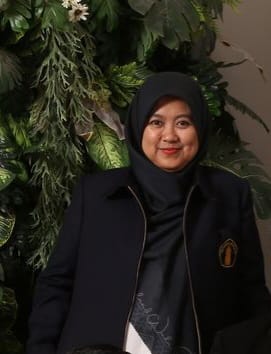
Corina Karim, S.Si. M.Si., Ph.D.
Universitas Brawijaya
Corina Karim, S.Si., M.Si., Ph.D., is a lecturer at the Department of Mathematics, Faculty of Mathematics and Natural Sciences, Universitas Brawijaya (UB), Malang, Indonesia. She erned her Doctor of Philosophy degree from Kumamoto University, Japan. At UB, she leads the Laboratory of Analysis, focusing on real analysis, harmonic analysis, and nonlinear partial differential equations.
She specializes in mathematical analysis and partial differential equations, particularly in the study of p-Laplacian systems and the regularity of weak solutions. Her research contributions include studies on Hölder regularity, local boundedness of weak solutions, and the existence of global weak solutions in evolutional p-Laplacian systems. Her work employs advanced mathematical techniques such as Campanato’s direct approach and the intrinsic scaling method, significantly contributing to the understanding of nonlinear differential systems.
Beyond pure mathematics, Corina Karim, Ph.D has explored interdisciplinary applications, including artificial intelligence and optimization. Her research includes using neural networks for terrain classification and applying ant colony optimization algorithms to manufacturing scheduling problems. In addition to her research, she actively participates in academic workshops and interdisciplinary collaborations, such as a workshop on assessment methodologies at UB’s Faculty of Computer Science in 2024. Her dedication to both theoretical and applied mathematics makes her a highly respected figure in the academic community.
Corina Karim, S.Si., M.Si., Ph.D., is a lecturer at the Department of Mathematics, Faculty of Mathematics and Natural Sciences, Universitas Brawijaya (UB), Malang, Indonesia. She erned her Doctor of Philosophy degree from Kumamoto University, Japan. At UB, she leads the Laboratory of Analysis, focusing on real analysis, harmonic analysis, and nonlinear partial differential equations.
She specializes in mathematical analysis and partial differential equations, particularly in the study of p-Laplacian systems and the regularity of weak solutions. Her research contributions include studies on Hölder regularity, local boundedness of weak solutions, and the existence of global weak solutions in evolutional p-Laplacian systems. Her work employs advanced mathematical techniques such as Campanato’s direct approach and the intrinsic scaling method, significantly contributing to the understanding of nonlinear differential systems.
Beyond pure mathematics, Corina Karim, Ph.D has explored interdisciplinary applications, including artificial intelligence and optimization. Her research includes using neural networks for terrain classification and applying ant colony optimization algorithms to manufacturing scheduling problems. In addition to her research, she actively participates in academic workshops and interdisciplinary collaborations, such as a workshop on assessment methodologies at UB’s Faculty of Computer Science in 2024. Her dedication to both theoretical and applied mathematics makes her a highly respected figure in the academic community.
Prof. Dr. Sri Adi Widodo, M.Pd.
Universitas Sarjanawiyata Tamansiswa

Prof. Dr. Sri Adi Widodo, M.Pd.
Universitas Sarjanawiyata Tamansiswa
Sri Adi Widodo is an associate professor of mathematics education at Universitas Sarjanawiyata Tamansiswa, Yogyakarta. He completed a Bachelor's Program in Mathematics Education at Sarjanawiyata Tamansiswa University Yogyakarta, a Master of Mathematics Education program at Universitas Sebelas Maret Surakarta, and a Doctor of Mathematics Education at Universitas Pendidikan Indonesia, Bandung. The research is mainly in mathematics education, media of learning in mathematics, sochio-mathematics, and single-subject research in mathematics education. The latest research currently includes the development of mathematics learning tools with local wisdom (2023-2024), and the implementation of sochio-mathematics to mitigate disasters (2024-2025). Apart from being a researcher and lecturer in mathematics education, he is the President of the Indonesian Mathematics Education Society (I-MES) for 2024-2026.
Sri Adi Widodo is an associate professor of mathematics education at Universitas Sarjanawiyata Tamansiswa, Yogyakarta. He completed a Bachelor’s Program in Mathematics Education at Sarjanawiyata Tamansiswa University Yogyakarta, a Master of Mathematics Education program at Universitas Sebelas Maret Surakarta, and a Doctor of Mathematics Education at Universitas Pendidikan Indonesia, Bandung. The research is mainly in mathematics education, media of learning in mathematics, sochio-mathematics, and single-subject research in mathematics education. The latest research currently includes the development of mathematics learning tools with local wisdom (2023-2024), and the implementation of sochio-mathematics to mitigate disasters (2024-2025). Apart from being a researcher and lecturer in mathematics education, he is the President of the Indonesian Mathematics Education Society (I-MES) for 2024-2026.
Dr. Dian Savitri, S.Si., M.Si.
Universitas Negeri Surabaya, Indonesia
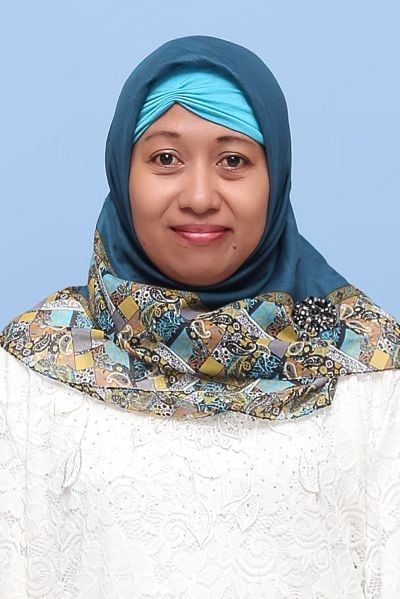
Dr. Dian Savitri, S.Si., M.Si.
Universitas Negeri Surabaya, Indonesia
Dian Savitri is an assistant professor at the Faculty of Mathematics and Natural Sciences in the Mathematics study program in the field of applied mathematics at the State University of Surabaya. Her research focuses on mathematical models of population dynamics and dynamic population behavior in an ecosystem. Her dissertation research discusses the prey predator model with competition in the interaction phenomenon of swiftlets and sriti birds. The research was continued in a wider ecosystem, including phenomena in the food chain in the mangrove and seagrass ecosystems and the dynamic behavior of the two ecosystems. The latest research focuses more on the dynamic behavior of pests, and natural enemies and interactions between populations in the mangrove ecosystem. In her current work, Dian introduces the existence of kleptoparasitism behavior in populations that can affect ecosystem stability along with the types of bifurcations or changes that occur in the population.
Dian Savitri is an assistant professor at the Faculty of Mathematics and Natural Sciences in the Mathematics study program in the field of applied mathematics at the State University of Surabaya. Her research focuses on mathematical models of population dynamics and dynamic population behavior in an ecosystem. Her dissertation research discusses the prey predator model with competition in the interaction phenomenon of swiftlets and sriti birds. The research was continued in a wider ecosystem, including phenomena in the food chain in the mangrove and seagrass ecosystems and the dynamic behavior of the two ecosystems. The latest research focuses more on the dynamic behavior of pests, and natural enemies and interactions between populations in the mangrove ecosystem. In her current work, Dian introduces the existence of kleptoparasitism behavior in populations that can affect ecosystem stability along with the types of bifurcations or changes that occur in the population.